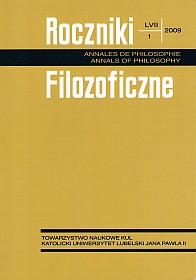Modern Transformations of the Idea of Autogeny
Abstract
Autogeny, sometimes also called “naïve”, spontaneous generation (Lat. generatio spontanea) is – most generally speaking – a view, according to which living creatures come into being spontaneously and voluntarily from inanimate matter. Such a broad formulation of the idea of autogeny, however, does not show significant differences that occur in understanding it. The basis for these differences is constituted by different definitions of what should be considered inanimate matter, and what – animate matter. A thorough consideration of the arguments that have been offered in the history of research into the nature in order to justify the idea of autogeny, and an investigation into the modern debates and controversies concerning this idea allow discovering a variety of interpretations of the view of a spontaneous and voluntary origin of biological organisms. The variety was formed together with the development of the scientific empirical method and with the participation of philosophical concepts explaining the way the animate world functions. With time, the idea of a spontaneous origin of organisms underwent many transformations, first consisting in limiting the range of its application (from macroscopic organisms with complex structure to relatively simple microorganisms), then in a change in its understanding, and finally to questioning the very idea. Also the way changed, in which the possibility of the occurrence of autogeny in the nature was motivated. However, it seems that the very core of the idea of autogeny, which contains a general thought about transformation of matter leading to the origin of living organisms is still maintained in the contemporary natural science.
References
Ariatti A., Comtois P.: Louis Pasteur: the first experimental aerobiologist, „Aerobiologia” 9 (1993), z. 1, s. 5-14.
Ariatti A., Mandrioli P.: Lazzaro Spallanzani: a blow against spontaneous generation, „Aerobiologia” 9 (1993), z. 2-3, s. 101-107.
Arystoteles: O rodzeniu zwierząt, [w:] tenże, Dzieła wszystkie, t. 4, Warszawa: PWN 1993, s. 194-195.
Arystoteles: O roślinach, [w:] tenże, Dzieła wszystkie, t. 4, Warszawa: PWN 1993, s. 372.
Arystoteles: Zoologia, [w:] tenże, Dzieła wszystkie, t. 3, Warszawa: PWN 1992, s. 457-469, 489-491.
Bastian H. Ch.: The Origin of Life, New York-London: The Knickerbocker Press 1911.
Bednarczyk A.: Filozofia biologii europejskiego Oświecenia. Albrecht von Haller i jego współcześni, Warszawa: PWN 1984.
Bednarczyk A.: Studia z dziejów idei naukowych. Biologia XVII-XIX wieku, Warszawa: WFiS UW 2007.
Brook J. H.: Natural Theology. W: Science and Religion. A Historical Introduction. Red. G. B. Ferngren, Baltimore–London: Johns Hopkins University Press 2002, s. 163-176.
Doetsch R. N.: Lazzaro Spallanzani’s “Opuscoli” of 1776, „Bacteriological Reviews” 40 (1976), z. 2, s. 170-175.
Farley J.: The Spontaneous Generation Controversy from Descartes to Oparin, Baltimore–London: Johns Hopkins University Press 1977.
Foote E. T.: Harvey: Spontaneous generation and the egg, „Annals of Science” 25 (1969), z. 2, s. 139-163.
Fry I.: The Emergence of Life on Earth. A Historical and Scientific Overview, New Brunswick–New Jersey–London: Rutgers University Press 2000.
Gillen A. L., Sherwin III F. J.: Louis Pasteur’s Views on Creation, Evolution and the Genesis of Germs, „Answers Research Journal” 1 (2008), s. 43-52.
Harris H.: Thinks Come to Life: Spontaneous Generation Revisited, Oxford–New York: Oxford University Press 2002.
Kloskowski K., Ślaga Sz. W.: Neopanspermia alternatywą abiogenezy?, [w:] Z zagadnień filozofii przyrodoznawstwa i filozofii przyrody, t. 13, red. M. Lubański, Sz. W. Ślaga, Warszawa: Akademia Teologii Katolickiej 1991, s. 109-156.
Kruif P. de: Łowcy mikrobów, Warszawa: Biblioteka Wiedzy 1930.
Lahav N.: Biogenesis. Theories of Life’s Origin, New York–Oxford: Oxford University Press 1999.
Lalarge de Lignac J.-A.: Lettres à un Américain sur l’« Histoire naturelle générale et particulière » de M. de Buffon et sur les observations microscopiques de M. Needham, Hambourg 1751.
Lauguel A.: Zagadki życia, (Biblioteka Filozofii Powszechnej, z. 4-6), Warszawa: Niwa 1873.
Mendelssohn E. I.: Philosophical biology versus experimental biology: Spontaneous generation in the seventeenth century, [w:] Topics in the philosophy of biology, red. M. Grene, E. I. Mendelssohn, Dordrecht–Boston: D. Reidel Publishing Company 1976, s. 36-65.
Philips J.: Life on the Earth. Its Origin and Succesion, Cambridge–London: MacMillan and Co. 1860.
Raynaud D.: Le correspondance de F.-A. Pouchet avec les members de l’Académie des Sciences: une révaluation du débat sur la génération spontanée, „European Journal of Sociology” 40 (1999), z. 2, s. 257-276.
Shu F. H.: Galaktyki. Gwiazdy. Życie. Fizyka wszechświata, Warszawa: Prószyński i S-ka 2003.
Strick J. E.: Sparks of Life. Darwinism and the Victorian Debates over Spontaneous Generation. Cambridge, Mass. – London, England: Harvard University Press 2002.
Ślaga Sz. W.: Teoria abiogenezy, [w:] Zarys filozofii przyrody ożywionej, red. S. Mazierski, Lublin: RW KUL 1980, s. 225-278.
Thomas G.: Microbes in the air: John Tyndall and spontaneous generation debate, „Microbiology Today” 11 (2005), s. 164-167.
Urbanek A.: Jedno istnieje tylko zwierzę… Myśli przewodnie biologii porównawczej, Warszawa: Muzeum i Instytut Zoologii PAN 2007.
Zaniewski R.: Teorie o pochodzeniu i rozwoju życia a naturalizm chrześcijański, Londyn: Katolicki Ośrodek Wydawniczy „Veritas”1959[2].
Copyright (c) 2009 Roczniki Filozoficzne

This work is licensed under a Creative Commons Attribution-NonCommercial-NoDerivatives 4.0 International License.





